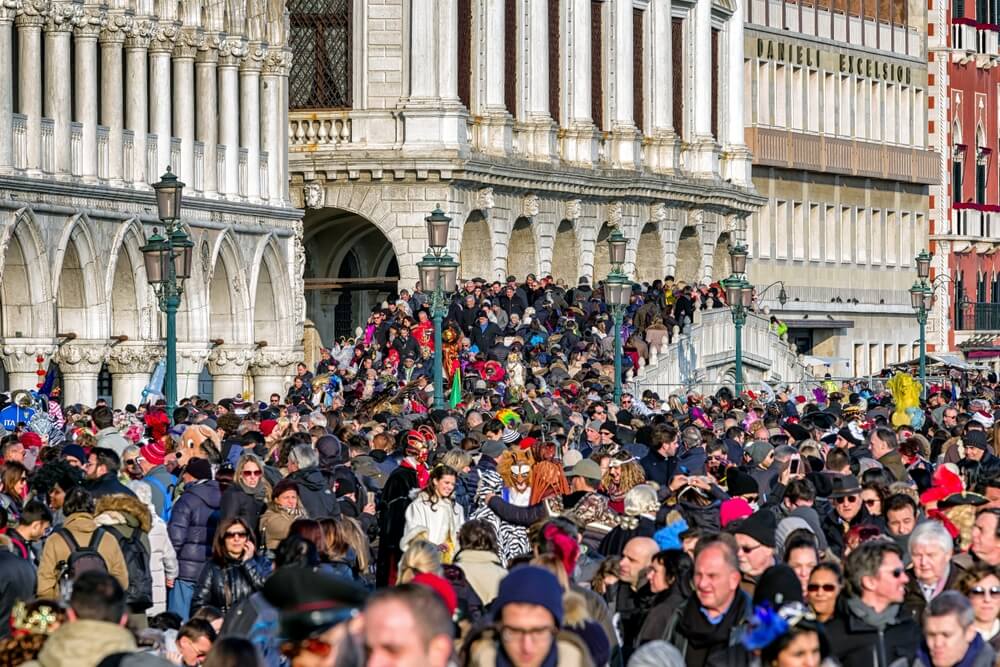Many office workers returning to their desks feeling a sense of back-to-school depression this autumn may be dreaming about their next holiday. When choosing their next destination, they may pause to reflect over the anti-tourism protests that spread domino-fashion across Europe from Athens to Venice this summer.
Snobs and leftists have united in their disdain for the hoards of tourists that descend on holiday hotspots while a host of new buzz words have cropped up as possible answers to deal with the very real challenges that mass tourism presents, such as housing shortages and overburdened water and transport systems.
“Degrowth” and “demarketing” are seen as solutions by some to stop so many people crowding out historic cities and resource-scarce islands described as “touristification” and “colonisation”.
But would it work to embark on an elitist quest to deter beer-swilling, loutish and often British tourists in favour of more discerning and cultural travellers? In 2020, when New Zealand marketed itself to richer visitors to limit tourists and raise revenues, there was little evidence that higher spenders add more to economic growth or protect the environment.
“Right to tourism”
Tourism experts have pointed out that deterring young budget travellers might mean losing the kind of visitor who returns later in life when much richer and seeking to revisit the haunts of their youth.
Whether it comes from working-class locals or richer residents, the disdain felt towards crowds of tourists was very real this summer in Europe.
In Barcelona locals blasted tourists with water pistols, chased them off restaurant terraces, and carried signs saying “Mass tourism kills the city”
For example, in Barcelona locals blasted tourists with water pistols, chased them off restaurant terraces, and carried signs saying “Mass tourism kills the city” on 6 July. The city’s mayor is also planning to eliminate 10,000 tourist flats by 2028 as part of a worldwide wave of resentment against the Airbnb platform for short-term housing rentals.
Barcelona received 26 million tourists last year and the direct economic impact was estimated at €12.75 billion. But local critics say the riches are far from being distributed equitably.
“We as a collective don’t really believe in consumption as a tool for transformation so we want to work instead on tourism production,” Daniel Pardo Rivacoba, part of the citizen group that organised the 6 July protest, told Teen Vogue, a paean to conspicuous consumption.
“This means regulating markets, like mandating that this airport must decrease its activity by half,” he said while decrying any “right to tourism”.
Carrots and sticks
Countries and cities are deploying a mixture of either carrots to attract a better kind of tourist or sticks to repel the uncouth in the quest for sustainable tourism.
The “Icelandic Pledge” asks tourists to act responsibly, such as never venturing off-road into potentially dangerous terrain or using the outdoors as a toilet.
Denmark has a programme to reward eco-friendly behaviour, such as riding a bike or helping to collect rubbish, with free drinks or more time on the city’s artificial ski slope.
 Venice introduced a €5 entrance fee to dissuade day trippers at peak times, especially those from cruise liners
Venice introduced a €5 entrance fee to dissuade day trippers at peak times, especially those from cruise liners
By contrast, Amsterdam last year told young British men to “stay away” while limiting the opening hours of brothels and bars. Destinations in Spain have also cracked down on alcohol sales and even banned inflatable penis costumes and sex dolls to deter unruly hen and stag parties.
Taxes are another stick but they have shown limited utility so far and Europe would be unlikely to get away with measures such as Bhutan’s $100 per night levy.
In April, Venice introduced a €5 entrance fee to dissuade day trippers at peak times, especially those from cruise liners. But critics say the city only raised €700,000 after the costs of implementing the programme were paid.
This did not deter Greece from announcing in early September a €20 levy on cruise ship visitors to the islands of Santorini and Mykonos during the peak summer season, with proceeds to be returned to local communities to spend on infrastructure. Greece also wants to increase a tax on short-term rentals and ban new licences for them in central Athens.
A balanced approach
A balanced approach is needed, says Peter DeBrine, senior project officer for Unesco. “What we’re seeing is that we’re breaching a threshold of tolerance in these destinations,” he told The Guardian. “It’s really trying to rebalance the situation. It’s totally out of balance now.”
A balancing factor may be climate change, with some travellers avoiding heat waves in southern Europe during the summer months in a trend dubbed “coolcation” as people head to Nordic and other cooler destinations.
Expect to hear more about the visitor attractions of countries from China and Thailand to Greenland and Turkey
Countries around the world are revisiting their marketing campaigns to take advantage of any tourist aversion to Europe sparked by the heat and this year’s unrest. Expect to hear more about the visitor attractions of countries from China and Thailand to Greenland and Turkey.
One factor in this summer of protests might be locals bundling up a host of grievances about housing, employment and social services that are better directed at their politicians rather than the easier target of tourists.
It remains to be seen if all these measures will shift numbers on the “irritation index” created by the academic George Doxey in 1975. It describes how the feelings of local residents about the development of tourism progress in four stages: euphoria, apathy, annoyance, and antagonism. The final stage seems to predominate across Europe for now.